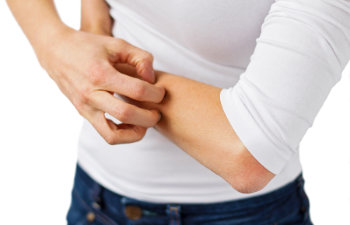
Dermatitis refers to inflammation of the skin that can result in various symptoms such as redness, itching, swelling and sometimes blistering or oozing. It is one of the most common types of skin conditions, affecting millions of people every year. There are several types of dermatitis, each with distinct causes, symptoms and treatment approaches. Understanding these different types is crucial for proper diagnosis and management.
Atopic Dermatitis (Eczema)
Atopic dermatitis, commonly known as eczema, is a chronic and relapsing inflammatory skin condition characterized by itchy and red patches that often appear on the face, hands, elbows and knees. It tends to run in families and is associated with a hypersensitivity reaction in the skin. The exact cause is not fully understood but involves a combination of genetic and environmental factors. Management includes moisturizers, topical corticosteroids, antihistamines for itching and sometimes immunosuppressants in severe cases.
Contact Dermatitis
This common type of dermatitis occurs when the skin comes into contact with irritants or allergens. There are two main types:
- Irritant Contact Dermatitis: Caused by exposure to substances like soaps, detergents, acids or chemicals that directly damage the skin’s outer layer. It results in redness, itching and sometimes blistering.
- Allergic Contact Dermatitis: Develops when the skin encounters an allergen, triggering an immune response. Common allergens include nickel, certain cosmetics, fragrances and certain plants like poison ivy. It manifests as redness, itching, swelling and sometimes blisters in the affected area. Treatment involves identifying and avoiding the allergen, along with topical corticosteroids and antihistamines for symptom relief.
Seborrheic Dermatitis
This chronic condition affects areas rich in oil glands, such as the scalp, face and upper chest. It presents as red, scaly and greasy patches accompanied by itching and flaking. The exact cause is not fully understood but involves a combination of genetics, a yeast-like organism called Malassezia and increased oil production. Treatments include medicated shampoos, topical antifungal agents, corticosteroids and calcineurin inhibitors.
Nummular Dermatitis
Characterized by round or coin-shaped lesions that are itchy, red and may ooze or crust. This type of dermatitis is more common in drier climates and often appears on the arms, legs or torso. The exact cause is not clear, but it may be linked to dry skin, irritants or an allergic reaction. Treatment involves moisturizing creams, topical corticosteroids and avoiding triggers that worsen symptoms.
Dyshidrotic Eczema
Also known as pompholyx, dyshidrotic eczema primarily affects the hands and feet, causing small, itchy blisters. The blisters may be triggered by factors like stress, allergies or exposure to certain metals. Treatment involves topical corticosteroids, antihistamines and keeping the affected area clean and dry.
Stasis Dermatitis
Occurring in the lower legs, stasis dermatitis results from poor circulation, usually due to underlying venous insufficiency or varicose veins. It leads to swelling, redness, itching and skin discoloration. Treatment includes improving blood flow with compression stockings, leg elevation, topical steroids, and addressing underlying vascular issues.
Perioral Dermatitis
This type of dermatitis affects the skin around the mouth, manifesting as red, bumpy, and sometimes scaly or itchy patches. Its cause is not definitively known but may be related to the use of topical steroids, cosmetics, or fluoride-containing products. Treatment involves discontinuing potential triggers, avoiding steroid creams, and using mild topical antibiotics or anti-inflammatory agents.
Neurodermatitis
Neurodermatitis, also known as lichen simplex chronicus, is characterized by thickened, scaly patches that result from repetitive scratching or rubbing in response to itching. It often occurs in localized areas, such as the back of the neck, scalp or ankles. Treatment focuses on breaking the itch-scratch cycle through topical corticosteroids, antihistamines, and behavior modification techniques to reduce scratching.
Since there are so many variations of dermatitis, it is essential to consult a dermatologist for an accurate diagnosis and appropriate treatment plan tailored to the specific type of dermatitis. Management often involves a combination of avoiding triggers, topical medications, proper skin care and, in some cases, oral medications or phototherapy to alleviate symptoms and prevent flare-ups.
If you have itchy, red or inflamed skin, you may be experiencing a form of dermatitis or some other skin condition. To get a diagnosis and treatment plan, contact our team at Medical Dermatology Specialists, Inc. Call our clinic in Atlanta, GA, to schedule an exam and consultation with one of our experienced dermatologists.
Posted on behalf of
5730 Glenridge Drive, Suite T-100
Atlanta, GA 30328
Phone: Call (404) 939-9220
FAX: (470) 312-2157
Email: jstalls@atlmedderm.com



